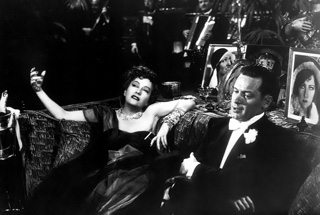AFInity: Sunset Boulevard
By Kim Hollis
November 30, 2009
My argument, however, is that Sunset Boulevard is at its heart a horror film. Joe Gillis may not literally be a prisoner in Norma Desmond's home – like Paul Sheldon to Annie Wilkes in Misery – but he is trapped there, a victim of circumstances that spiral beyond his control. When he does try to make his escape, he is either drawn back into Norma's web or he is destroyed. For that matter, Norma's insanity makes her a perfect horror film villainess. Overly dramatic and dominating the screen, when she opens her mouth to speak you can't help but be captivated even as she's utterly terrifying. At times, she even evokes comparisons to the Bride of Frankenstein.
All of these moving pieces require note-perfect performances for the film to work, and Wilder elicits them from his players, none of whom were the first choices for their respective roles. William Holden was eventually selected to portray Gillis, and what a remarkable actor he would prove to become. He's ideal for the wry Joe, coming off as a bit of an opportunist even though there's a hopeless romantic hidden somewhere deep within his shell. It's a revelatory role for the actor, and Wilder was impressed enough with Holden that he cast him again in Stalag 17 and Sabrina.
I especially love the decision to cast Gloria Swanson as Norma Desmond alongside Erich von Stroheim as Max. Swanson was a true star of silent film, and while it might have been troublesome to play a character whose story mirrored some of her life (Swanson, too, lived in a Sunset Boulevard mansion and struggled with the transition to talking pictures), she immersed herself into Norma, making her a horrifying yet fascinating personage. Meanwhile, von Stroheim was a leading helmer of the 1920s and even had directed Swanson in Queen Kelly. He is magnificently creepy as Max, a completely inscrutable man whose secrets become the key to unraveling Norma's story – and similarly mirror his own career trajectory.
Wilder's screenplay and direction must be credited for never giving away too much too soon. Of course the viewer comprehends that Norma is batty, but the level of her despair is only revealed by degrees. Wilder frames her in some spectacular shots, as well, from the spotlight shining on Norma at Paramount Studios to that famous final frame where she fades to a blur after declaring she's ready for her close-up.
Other than the fact that the music is a little bit silly by today's standards, Sunset Boulevard is a film for the ages. Today, as in 1950, screenwriters are downtrodden and often are the unappreciated cogs in the Hollywood machine. Stars fade, and while there might be an occasional Robert Downey Jr. or Mickey Rourke who recaptures their earlier glory, they are the exception rather than the rule. And knowing that you were once so loved, how hard must it be to deal with the utter indifference of the crowd? Sunset Boulevard is a deeply cynical film, but its truths are still steadfast.
Kim's AFInity Project Big Board
Continued:
1
2
3
|
|
|
|




